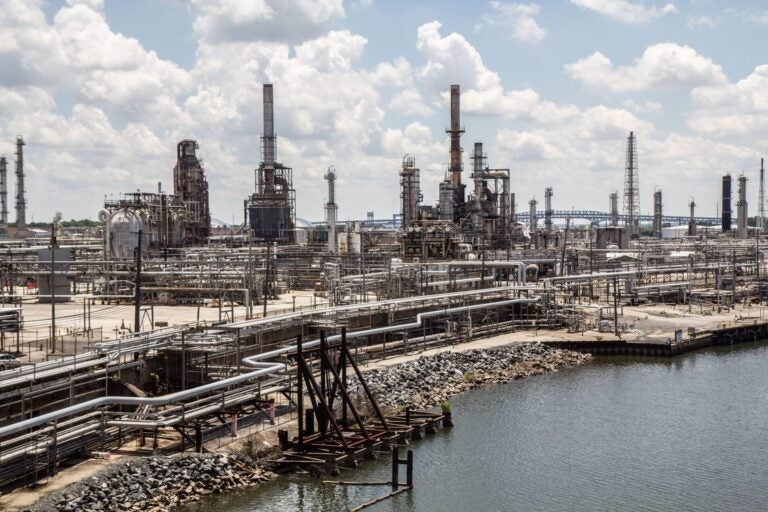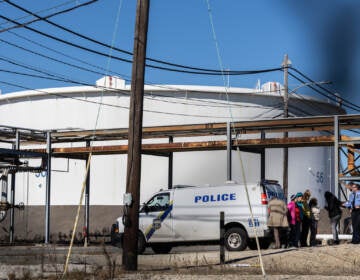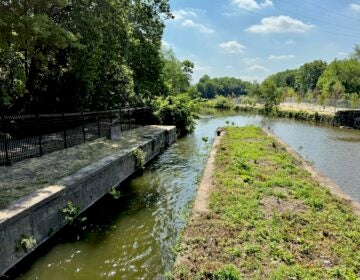Community benefits agreement talks to start in 2023 for Philly refinery redevelopment
The company redeveloping the former refinery plans to use a third-party facilitator to negotiate an agreement with community stakeholders.

File photo: The former PES refinery site in South Philadelphia on June 2020. (Kimberly Paynter/WHYY)
A developer transforming the former Philadelphia Energy Solutions refinery site in South Philadelphia plans to start negotiations with community groups early next year.
Hilco Redevelopment Partners (HRP) committed to negotiating a community benefits agreement during a virtual public meeting earlier this fall. The company plans to turn the massive former refinery site into a warehousing and life sciences hub, and has cast itself as a better neighbor than the refinery, which was the single largest source of unhealthy particulate pollution in the city. It closed after a huge fire and explosion in 2019.
“A community benefits agreement or a CBA is a commitment made between a developer and community members that really solidifies the community’s input in a project and how a developer gives back,” said Mia Fioravanti, vice president for corporate affairs with HRP, during a virtual public meeting Tuesday. “Our goal is to be transparent and to ensure that this project is one that we can all be proud of.”
A community benefits agreement has been the chief demand of a coalition of community groups, called the United South/Southwest Coalition for Healthy Communities, which formed in early 2021 to ensure that nearby residents benefit from the refinery redevelopment. The coalition has pushed for assurances around carbon-free development at the former refinery site, environmental health, community assets, anti-displacement, and employment. As recently as this summer, members said they had not gotten the seat at the table they want to help shape the redevelopment plans.
HRP representatives said they were open to a community benefits agreement, but it wasn’t until September, during one of HRP’s quarterly virtual public meetings that the company publicly committed to it. HRP representatives said they would negotiate the agreement through their community advisory panel, and invite the United South/Southwest Coalition for Healthy Communities to join.
Not long before this announcement, the activist group Registered Community Organization Philly Thrive dropped out of the Coalition, in order to stage direct actions and speak publicly about the redevelopment “without constraints,” said campaign coordinator Alexa Ross, while allowing the United South Southwest Coalition to “stay in position to negotiate” the CBA with HRP.
Philly Thrive has been actively pushing for healthy and safe uses of the former refinery site since the explosion. This fall, the group held a series of direct actions, including a sit-in which led to several arrests at the former refinery’s temporarily shuttered oil tank farm. The group plans to “continue the public conversation with as many impacted groups as possible about what CBA terms really are most critical for this particular redevelopment,” Ross said.
During Tuesday’s meeting, HRP staff revealed a list of more than two dozen stakeholders that will be involved, including Bartram Village Resident Council, Eastwick Friends and Neighbors Coalition, Point Breeze CDC, Drexel University, the University of Pennsylvania, the Philadelphia Office of Emergency Management, the Philadelphia Police Department, the Philadelphia International Airport, the PIDC/Navy Yard, and the South Philadelphia Business Association. HRP says institutions like Drexel and Penn, PIDC/Navy Yard, as well as city agencies, will not have voting power.
The United South/Southwest Coalition is currently in discussions with HRP to gain clarity on the process and is considering the invitation to join the Community Advisory Panel, said Carolyn Moseley, a member of the United South/Southwest Coalition spokespersons team.
HRP’s tight control over the CBA negotiating process — including which organizations are at the table — is “concerning,” Ross said. She would like to see monitoring for toxic benzene and flood control, concerns consistently raised by community members during public meetings, included in the CBA — but she’s worried HRP may “slant” the CBA terms away from community priorities.
A third-party facilitator will oversee the negotiations, according to HRP. The company plans to start the negotiation process in early 2023, and the first step will be interviewing and choosing the facilitator.
The stakeholders will meet each month to discuss a single topic, such as workforce development, Fioravanti said.
HRP hopes to have a signed agreement roughly a year later.
“However, it is possible that that process will take longer,” she said.
Fioravanti said HRP is interested in commitments that seem to align with community interests that she said the company gauged through a survey.
“Some of the topics we might consider … would be workforce development initiatives, … certainly investments in green spaces, you know, investments in local schools and scholarship programs,” she said.
WHYY is your source for fact-based, in-depth journalism and information. As a nonprofit organization, we rely on financial support from readers like you. Please give today.








